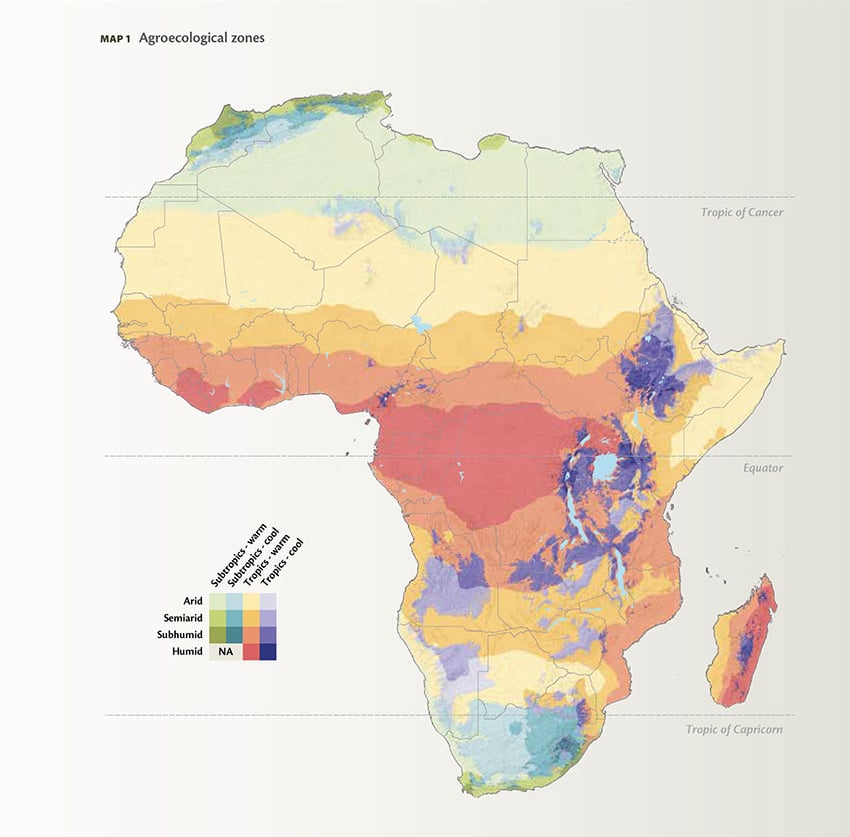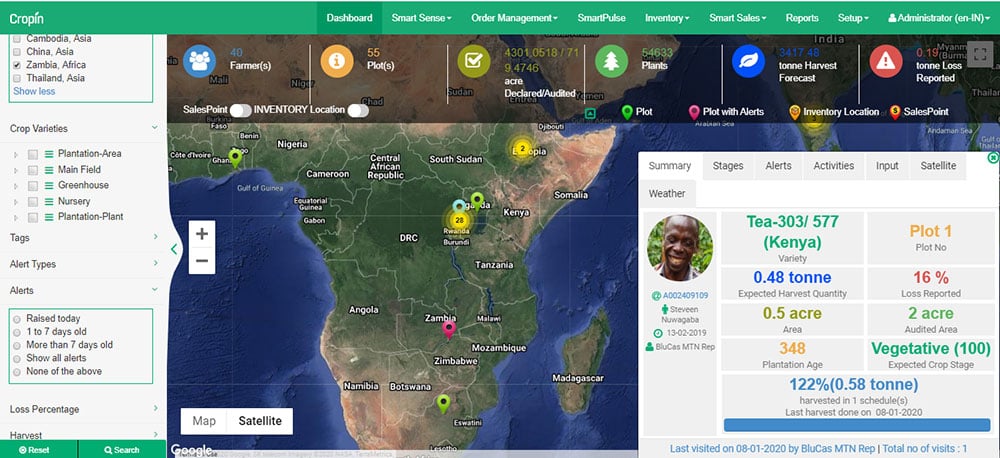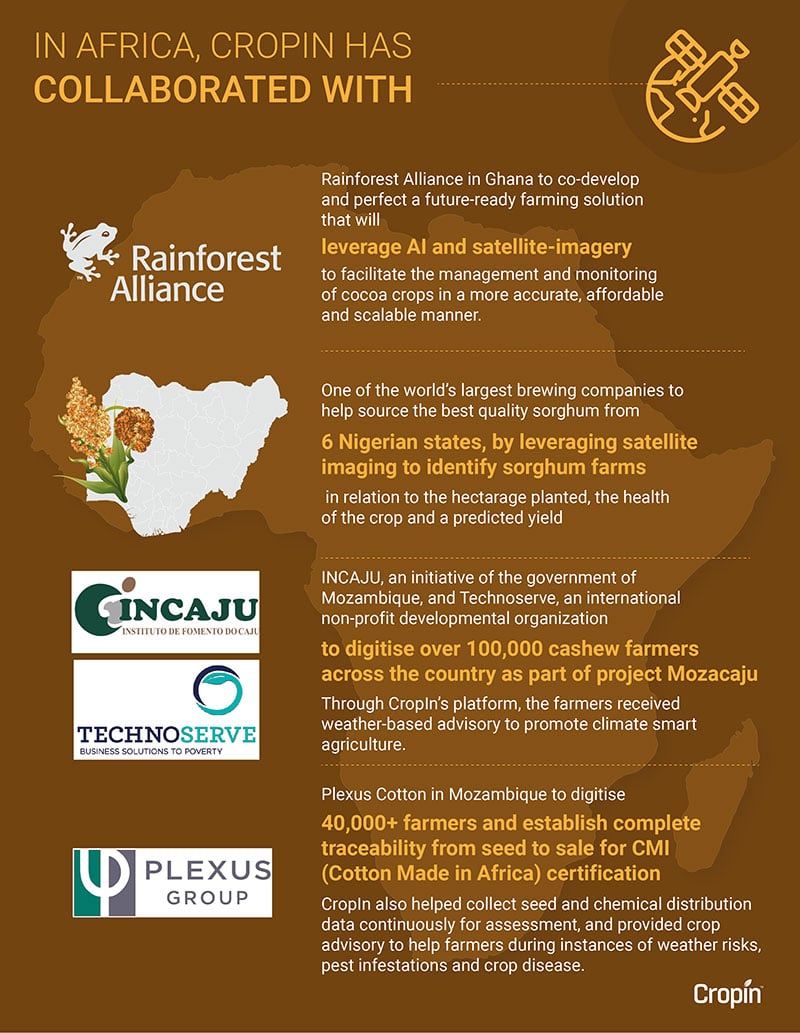Listen here:
Among the most recurring climatic events around the world, droughts across Africa are most notorious for the distressing impact they have on regions across the continent each year. However, the weather patterns in the past few years have been more unpredictable, and their effects more intense.
Across Africa, an estimated total loss of USD 372 billion was recorded from 2014 to 2017. In 2018, South Africa’s western province saw a decline of 20% in agriculture output, and 33,000 jobs were lost due to extreme drought conditions. The total loss accounted for was close to half a billion dollars in value. The severe scarcity of water was estimated to affect South Africa’s wine exports as well, with an expected decline of 13-20%.
Weather extremities such as this have been affecting agriculture globally, resulting in significant losses in the production and distribution of food products. In 2019, there was a loss of nearly 25% in the value of wine and other food products exported. In some parts of South Africa, job losses were as high as 25%.
Source: BBC News
The smallholder farming community constitutes one of the most distressed labor forces in Africa. Insufficient policies and measures to prevent water shortage and the lack of adequate infrastructure or technology for irrigation have forced them to rely heavily on seasonal rainfall that now seems to have abandoned them in their hour of desperate need. Rainfall has hit a record of an all-time low as of 2019 in Southern Africa, which has discouraged farmers from planting grain as they would every year in mid-November. Grain, in Africa, is a staple in the diet of both humans and livestock, and the severe shortage of water is a pressing threat to food security in the region.
But we can’t fight the weather, or can we?
What about the other major challenge facing African farming companies? Pest infestation is a huge roadblock to sustainable agriculture in Africa. Maize, which is a staple crop for many parts of Africa, was severely infected by the fall armyworm, causing damage close to $3 billion. Insect pests destroy close to 50% of total crop yield every year, which adversely affects a third of the total households in Africa.
We can’t completely get rid of pest infestation, too. So, is it all doom and gloom for the agricultural sector in Africa? Maybe not, if agribusinesses undertake preventive measures to mitigate such risks and increase climate resilience by managing farms with the use of cutting-edge technology.
How Do Agritech Solutions Enable Climate-Smart Agriculture?
Regular tracking and monitoring of crops:
- Digital farm management solutions help in the early identification and control of pest infestation. Moreover, they can help treat only those areas that are affected rather than treating an entire farm, thus saving time and resources. Read more here.
- Smart Farming also enables easier identification of crops that are or are not performing well. It also helps producers analyze how well the crop is doing after being fertilized, monitor which nutrients are required for a particular crop and soil type, and optimize other important aspects of cultivation to increase crop yield.
Standing tall against poor weather conditions:
- Weather forecast information enables the smart selection of crops that are best suited for the expected weather conditions. It also helps with well-planned day-to-day farm operations such as sowing, timely crop protection, optimum application of fertilizers, scheduling irrigation, etc. In India, where weather and temperature conditions are similar to that in Africa, weather advisories have been able to reduce input costs by up to 10% and also successfully increase per-acre productivity and revenue.
- Rice is gaining popularity as one of the most important food crops in the African continent, with 40% of the requirements being imported every year at a cost of over USD 1 billion. However, the geographical and climatic conditions in most African countries favor the cultivation of certain varieties of rice like Swarna rice, which is considered to be water tolerant. Such an understanding of agroecological zones (AEZs) and prevalent weather conditions help identify suitable crops and climate-resilient practices. It further enables producers to overcome some of the challenges imposed by tough weather conditions, while also reducing costs at the same time.

Agroecological Zones, Africa. Source: Atlas Of African Agriculture Research & Development
Note: Moisture classes are defined as follows: Arid = length of growing period (LGP) of less than 70 days; Semiarid = LGP of 70–180 days; Subhumid = LGP of 180–270 days; and Humid = LGP of greater than 270 days
The applications of modern agriculture technology do not end here. Each dawn is a new opportunity for scientists, agronomists, and agritech startups to present innovative solutions that help build farms of the future.
Agribusinesses that own and manage multiple farmlands across Africa leverage the power of digitization to access all farmlands spread across geographies with just your fingertips. Mobile and web-based platforms such as Cropin’s deliver insights on the performance of each farm with respect to its production lifecycle. Real-time yield estimates for each crop variety based on different parameters like changing weather conditions, the irrigation method used, and agrochemical application enable these businesses to have clear visibility over the entire cultivation cycle, from before sowing to harvest and beyond.

Using Cropin’s SmartFarm on their smartphones, farmers or field extension staff can send pest or disease alerts, along with an image of the infected crop. This will be sent to agronomists to enable them to provide corrective or preventive measures to stem the risk at the earliest possible stage.
Alternatively, alerts can be pre-configured to notify farmers or field extension staff about an upcoming change in weather (rise or fall of temperature, rainfall, change in humidity) that could possibly affect the crop or lead to the spread of a disease/pest.
SmartFarm reduces the time taken to overcome a particular challenge, get real-time updates on crops being cultivated, and obtain timely recommendations to improve crop yield, thus increasing overall revenue. Agritech solutions have proven to save countless hours spent in farm and business operations and thousands of dollars in losses. It also increases thousands of farmers’ income by generating higher revenue per acre of land through the practice of climate-smart agriculture.
Cropin is at the epicenter of technological advancement in agriculture. We aim to tackle today’s challenges in agriculture using the treasure of agricultural big data made available across the agri-ecosystem, to pave the way for a more sustainable agriculture tomorrow.
Our state-of-the-art farm management solution SmartFarm can help you
- Build a robust and flexible system for farm and farm data management
- Obtain satellite and weather-based advisory for crop cultivation
- Increase visibility over farm operations for higher agricultural productivity
- Enable farm-to-fork traceability
- Manage pest infestation and diseases effectively
- Derive on-the-go crop reports and insights
- Drive sustainable and climate-smart agriculture
and do much more…
Cropin is a trusted partner for many multinational enterprises, financial institutions, development aid agencies, and numerous governmental entities around the globe.











